Business
Kenya’s celebrated coffee under threat as farmers hit by climate change
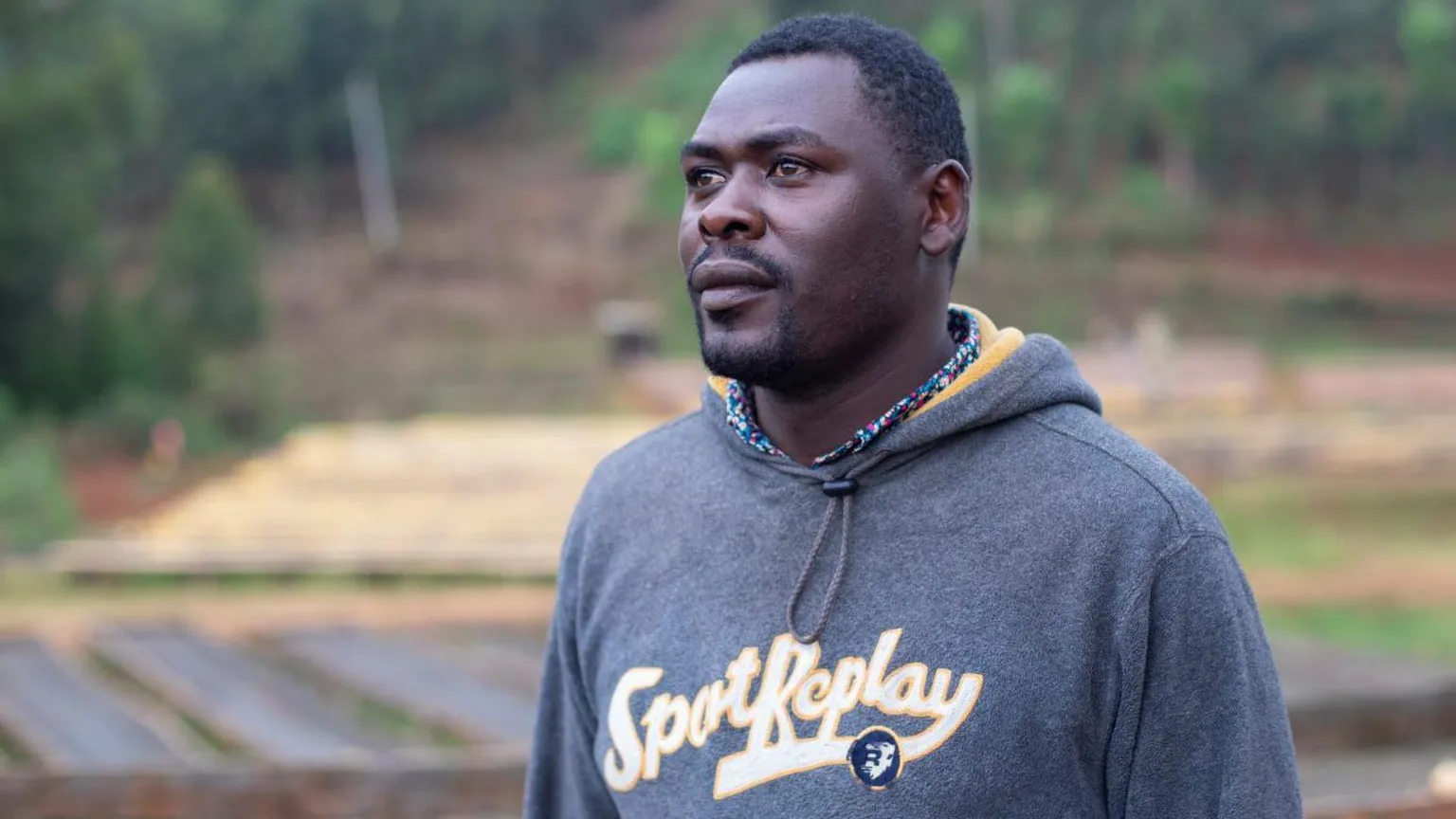
Kate Stanworth Simon Macharia, one of the Kenyan coffee farmers stands a coffee processing plant in Komothai, KenyaKate Stanworth In the lush, volcanic highlands of Komothai in Kenya’s Rift Valley, farmers like Simon Macharia produce coffee on small plantations scattered across the hillsides.
Along with other farmers, Mr Macharia brings sacks of his bright red coffee cherries to the local processing plant, where they are weighed and treated.A machine removes the red husks, and the pale beans inside are washed and passed along concrete channels, ending up on lines of drying platforms that sweep across the valley.
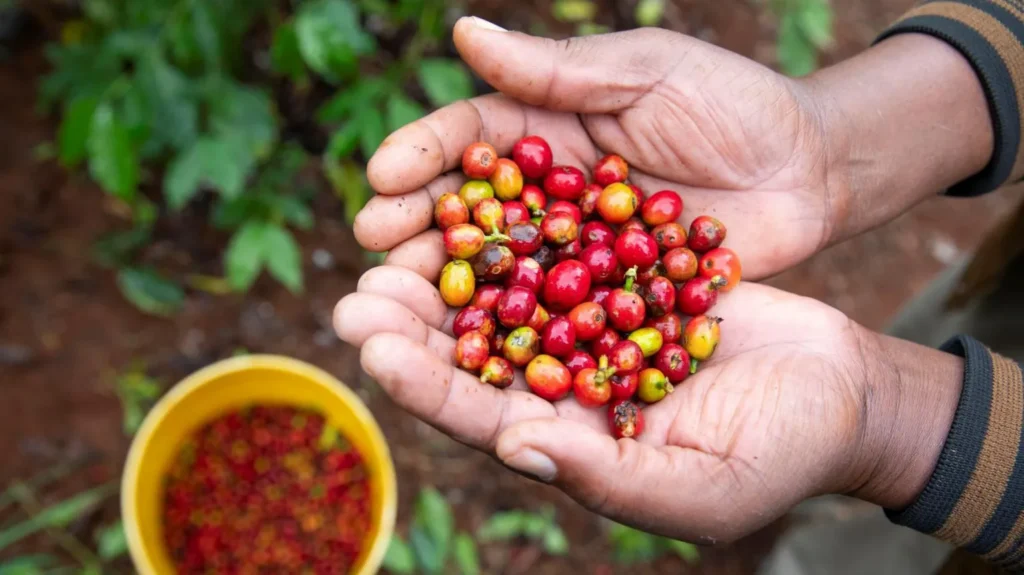
Here, workers categorise the beans into grades, the highest destined for the coffee houses of Europe.”We call coffee the black gold around here,” Mr Macharia, whose farm covers 2.5 hectares (six acres) , told the BBC.He grows the Kenya AA coffee beans, which are prized worldwide for their high quality, full body, deep aromas and fruity flavour.
Kate Stanworth A person hold bright red coffee beans in their hands Kate Stanworth Once harvested the beans need to be taken from the berries and then dried.
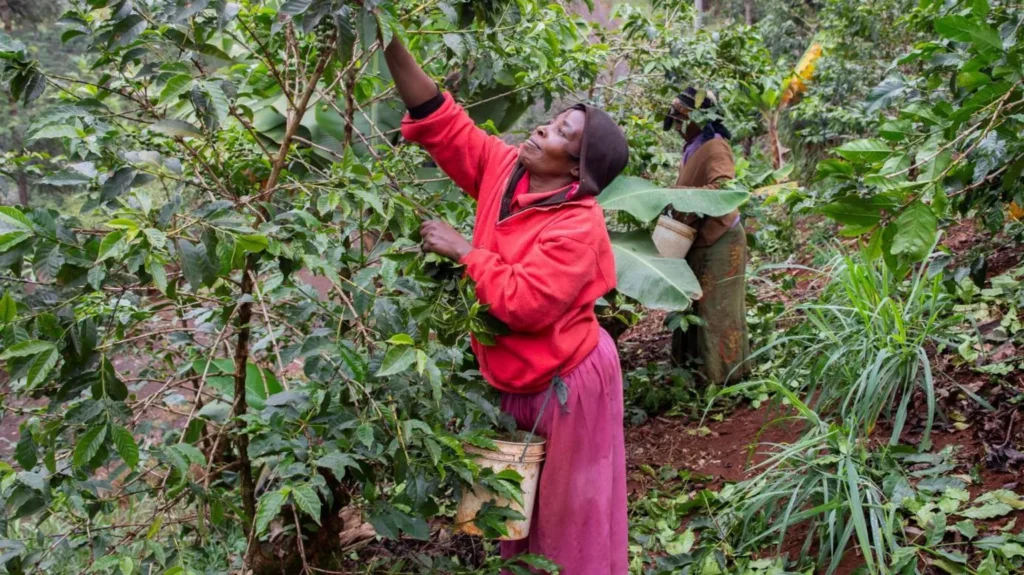
The crop has been part of these lush highlands since the late 1890s, when British colonial settlers introduced it.
Now, the area is famous for its unique, top-rated coffee.Growing the berries is labour intensive – picking, pruning, weeding, spraying, fertilising and transporting the products.
“Coffee requires your full-time concentration, especially when it starts to bloom,” Mr Macharia said.”From that moment up until the day that you are going to harvest – those six months, your full-time job is on the farm.”The bean that could change the taste of coffee, Coffee price surges to highest on record.
A coffee tree is a huge investment for cash-strapped farmers, as it can take four years for the fruits to mature. The price of a single cup of coffee in a chic European café, typically $4 (£3.20), highlights a stark disparity when compared to the earnings of many Kenyan coffee labourers, who make at most $2.30 a day.Edita Mwangi, who harvests coffee cherries on the red earth hillside overlooking the processing plant, confirms this.
“They don’t know the poverty we suffer. You have to struggle day and night just to survive,” she said.With four children depending on her, Ms Mwangi works six days a week, earning about $1.40 a day. She has to walk 5km (three miles) to reach the farm where she works.Kate Stanworth A woman picks coffee berries on a small farm in Komothai, Kenya.
Kate Stanworth, The daily wage of most Kenyan coffee workers is less than the price of a cup of coffee in Europe Farmers feel the trading system between Kenya and Europe – the world’s largest coffee market – has been stacked against them for many years. But now, a new threat looms, jeopardising farmers’ ability to make a living – climate change.
Coffee trees are extremely sensitive to small differences in temperature and weather conditions.They also need specific climatic conditions like humid temperatures and ample rainfall to grow.”Climate change is a major challenge for our coffee farmers,” says John Murigi, the chairman of the Komothai Coffee Society, which represents 8,000 coffee farmers like Mr Macharia.
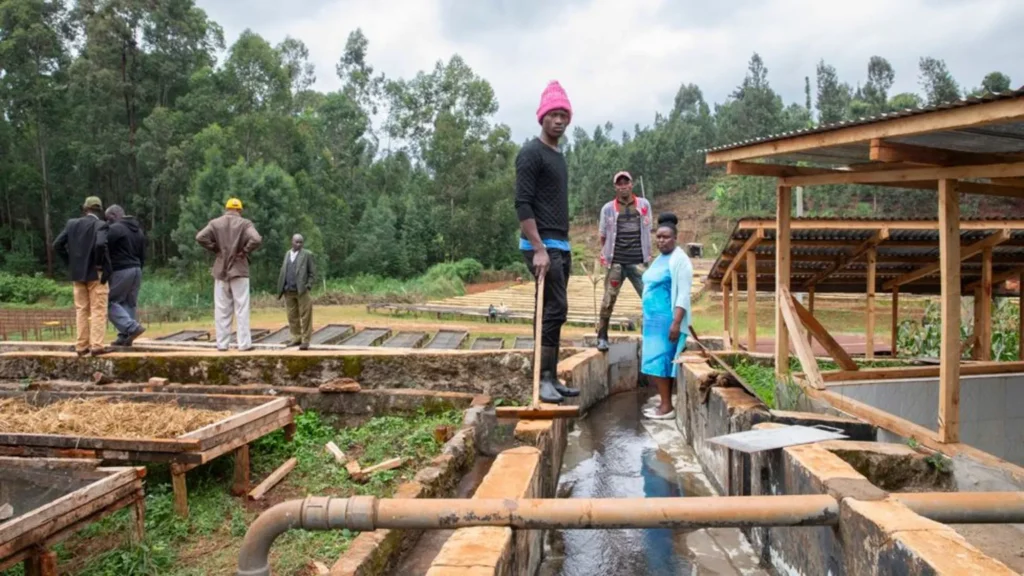
Cold temperatures and erratic rainfall are having a devastating impact on the delicate coffee plants, said Mr Murigi. As a result, “coffee production has decreased over the last few years”.He added that climate change was intensifying the spread of diseases in coffee plants.Mr Murigi said there had been a significant increase in coffee leaf miners, bugs that feed on coffee leaves, and coffee berry disease, a destructive fungal infection that can wipe out more than 80% of crops.
To deal with the increasing outbreaks, farmers are resorting to using herbicides and insecticides that can damage soil quality in the long term and also pose health risks.Farmers use dangerous herbicides like Roundup, which contain glyphosates known to cause cancers – banned in some European countries – to ensure they get a good harvest.
Pest Control Products Board (PCPB) of Kenya, in charge of regulating the use of these products, did not respond to a BBC request for comment.Kate Stanworth Coffee processors stand near a water channel where they’re washing and drying the coffee beans.Kate Stanworth.
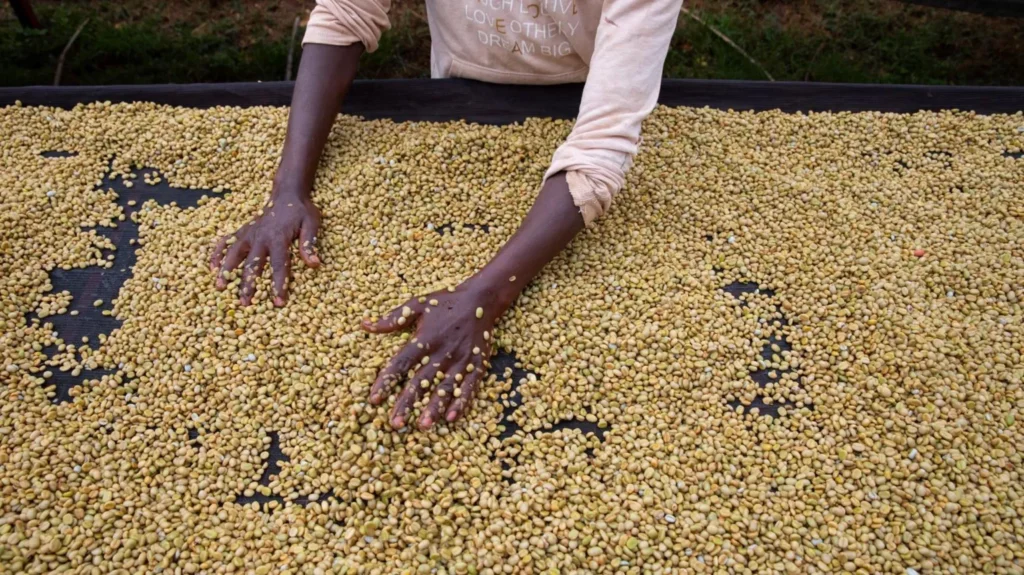
The beans that are harvested are washed and dried near the farm, To produce a single cup of coffee can require up to 140 litres of water – including the water to grow the plants. But in Kenya’s fertile Rift Valley, higher temperatures and changing rainfall patterns mean a decreasing water supply for coffee farmers.Farmer Joseph Kimani told the BBC that the “river levels have gone down a lot” due to erratic weather, such as periods of drought and heavy rains.
He said that because of the lack of rain, farmers are forced to use more river water.But this increased reliance on river water, driven by the lack of rainfall, may be further straining the already limited water supply.
While Mr Murigi acknowledges the rise in water use by coffee farmers, he denies this is why the river is drying up.However, with 23 coffee societies in this region, a significant amount of water is clearly being used in the coffee growing process in Kiambu County.
Komothia’s story is not unique. As global temperatures and droughts increase, good coffee will become difficult to grow in all parts of the world.Kate Stanworth Workers process coffee beans at a coffee processing plant in Komothai, KenyaKate Stanworth Once the beans are dried they are then usually exported for further Processing coffee can only be grown in the “coffee belt” – tropical regions around the world in areas typically located at an altitude of between 1,000m and 2,000m.
In recent years, climate change has led to a shortage of global coffee supplies and an increase in the price of coffee due to drought and crop failures in several key coffee-producing nations such as Brazil and Vietnam.A survey by Fairtrade International, the organisation behind Fairtrade labels, found that 93% of Kenyan coffee farmers are already experiencing the effects of climate change.The coffee industry in Kenya is a key source of employment, providing jobs for an estimated 150,000 people.
To protect the industry, coffee farmers in areas like Komothai are experimenting with climate adaptation techniques, such as planting trees to provide extra shade for the coffee plants.
Mr Murigi said it is only through addressing both the climate and economic challenges faced by Kenyan coffee farmers that they can have a sustainable future.
However, coffee farmers like Mr Macharia are pessimistic about the industry’s future.”Right now, as things stand, I don’t think any parent wants their child here farming coffee,” he said.
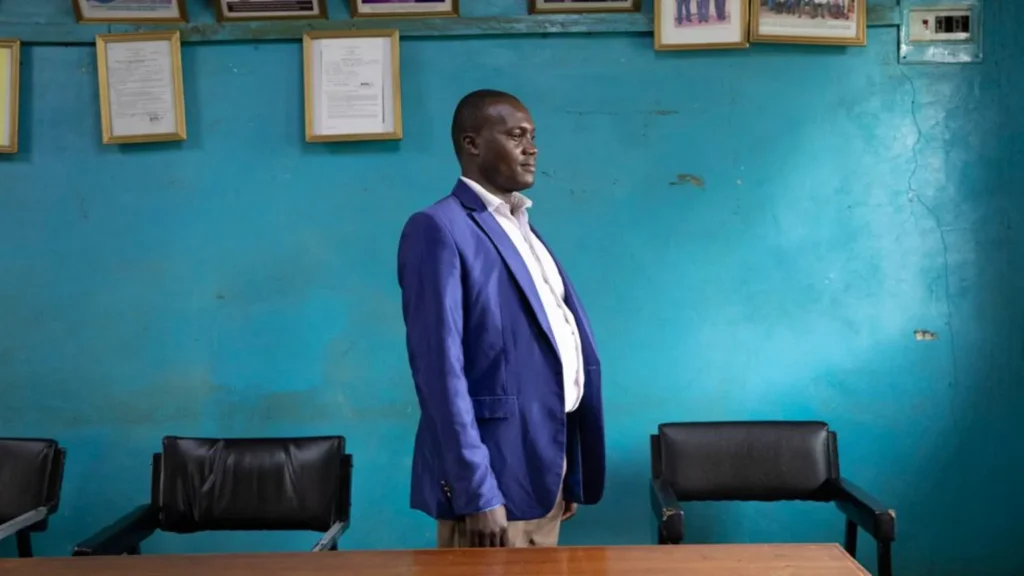
Source: BBC
Business
Aliko Dangote Steps Down as Chairman of Dangote Cement | Former SEC Official Appointed as Successor

Dangote Cement has announced that Aliko Dangote, its majority shareholder and founder, has officially stepped down from his role as chairman of the cement company. On Friday, Anthony Chiejina, the chief officer for branding and communications at Dangote Group, revealed that Dangote has decided to retire from the position in order to dedicate more time to the Dangote Petroleum Refinery, as well as the petrochemical and fertilizer plants, and to strengthen government relations.
Chiejina has confirmed the appointment of Emmanuel Ikazoboh, an independent non-executive director, as the new chairman.
Additionally, the company spokesperson mentioned that Hajiya Mariya Aliko Dangote has been added to the board of directors, while Dorothy Ufot, also an independent non-executive director, has retired from the board.
“Renowned entrepreneur and founder of Dangote Cement Plc, Aliko Dangote, has announced his retirement from his role as Director and Chairman of the Board of Directors, effective July 25, 2025,” stated Chiejina. He is stepping down to concentrate more on the refinery, petrochemicals, fertilizers, and government relations to elevate the company’s five-year business goals.
The Dangote Cement PLC board has thus appointed Emmanuel Ikazoboh as the new Chairman of the Board of Directors. In this transition, Hajiya Mariya Aliko Dangote will also join the Board, while Prof. Dorothy Ufot has stepped down.
‘DANGOTE LEAVES A LEGACY’
Chiejina remarked that the billionaire is leaving a remarkable legacy as he departs from the board, highlighting how his vision and determination not only transformed his company but also revolutionized the entire cement sector, establishing it as the largest cement producer in Africa and the leading exporter of cement and clinker in Sub-Saharan Africa. “Aliko Dangote’s exceptional journey in the cement industry started with an ambitious dream: to make Nigeria and Africa self-sufficient in cement manufacturing. Through strategic investments in advanced plants and a commitment to local sourcing, he not only achieved that but surpassed it,” he noted.
Currently, Dangote Cement boasts a capacity of 52.0 million tons annually across the African continent, with Nigeria’s share at 35.25 million tons. Additionally, new greenfield projects are in progress in Côte d’Ivoire (3.0 million tons) and Itori, Nigeria (6.0 million tons), which will push the total capacity to 61.0 million tons upon completion later this year.
“Under his visionary leadership, Dangote Cement has achieved record revenue and Earnings Before Interest, Taxes, Depreciation, and Amortization (EBITDA) in its history. According to the unaudited results for the six months ending June 30, 2025, group revenue surged by 17.7% from ₦1,760 billion in the same period in 2024 to ₦2,071.6 billion, marking the highest revenue ever recorded by the company.
“The group’s EBITDA grew by 41.8% to N944.900 billion from N666.22 billion. EBITDA from Nigeria operations increased by 82.4% to N845.4 billion. Profit before tax rose significantly from N292.96 billion to N730 billion, reflecting a 149% increase, while profit after tax soared by 174.1% to ₦520.5 billion, compared to N189.90 billion for the preceding period.”
Chiejina highlighted that cement exports from Nigeria grew by 18.2% in the first half of the year, with 18 successful shipments of clinker to Ghana and Cameroon. “Aliko Dangote’s legacy will be measured by the millions of jobs generated, the infrastructure constructed, and the renewed faith in Africa’s industrial capabilities,” the spokesperson concluded.
“He has demonstrated that Africa can produce, compete, and excel on the global stage. Notably, subsidiaries under the Dangote Group contributed over N402 billion in taxes in 2024, solidifying its position as the top taxpayer in the nation.”
IKAZOBOH COMMITS TO COST-REDUCTION INITIATIVES
In his acceptance remarks, Ikazoboh expressed his honor in taking on the role and committed to maintaining the highest standards of leadership and commitment. He also outlined his intention to implement rigorous cost-reduction strategies to mitigate inflationary pressures and enhance competitiveness during his tenure.
Ikazoboh emphasized that the company would expedite initiatives to adopt alternative fuels and technologies, aiming to reduce dependency on fossil fuels and contribute to a more sustainable future. According to Chiejina, the newly appointed chairman previously served as the group chairman of Ecobank Transnational Inc. and began his career at Akintola Williams Deloitte.
Ikazoboh became the managing partner for francophone offices in Cameroon and Côte d’Ivoire before eventually serving as the managing partner for Deloitte in West and Central Africa until 2009. In 2010, Chiejina added, Ikazoboh was appointed by the Securities and Exchange Commission (SEC) as an interim administrator, tasked with implementing capital market reforms for the Nigerian Stock Exchange (NSE), now referred to as the Nigerian Exchange.
Business
2026 Deadline: Eight Banks Have Achieved New CBN Recapitalization Requirements – Cardoso

Mr. Olayemi Cardoso, the Governor of the Central Bank of Nigeria (CBN), has shared that eight commercial banks have successfully fulfilled the recapitalization mandates set forth by the central bank, while several others are steadily advancing toward the goal.
The CBN had previously established a 24-month timeline for recapitalization, starting from April 1, 2024, and concluding on March 31, 2026. According to this directive, banks with international licenses must maintain a minimum paid-up capital of ₦500 billion, national banks should meet a threshold of ₦200 billion, and regional banks are required to uphold at least ₦50 billion in capital.
Cardoso provided this update in Abuja during a press briefing following the 301st meeting of the Monetary Policy Committee (MPC) of the CBN. However, he did not disclose the names of the banks that have successfully met the requirements as of the time of this report.
Business
Otedola Strengthens Control over FirstBank with 40% Share Acquisition

Femi Otedola, the billionaire businessman, has gained significant control over FBN Holdings, the parent company of First Bank of Nigeria, following the acquisition of approximately 40% of its shares through a substantial off-market transaction on the Nigerian Exchange. The deal, which involved 17 negotiated trades at ₦31 per share, resulted in the transfer of about 10.43 billion shares of FBN Holdings, valued at over ₦324 billion. This acquisition, corroborated by trading data and capital market insights, represents a pivotal shift in the ownership of one of Nigeria’s oldest and most respected financial institutions.
Otedola’s acquisition comes in the wake of a protracted boardroom conflict involving previous major shareholders like Oba Otudeko and Hassan Odukale, who reportedly divested their shares to enable this transaction. With this purchase, Otedola emerges as the majority shareholder, granting him considerable sway over board deliberations and the strategic direction of the company.
The share price of FBN Holdings reacted favorably to the news, rising nearly 10% to settle at ₦32.20, which elevated the company’s market capitalization to over ₦1.3 trillion. Analysts interpret this development as a renewal of investor confidence and a potential precursor to assertive reforms under the new leadership.
However, FBN Holdings must promptly address the challenges set forth by the Central Bank of Nigeria’s directive for recapitalization. The CBN has mandated that all banks achieve a minimum capital base of ₦500 billion. As of June, FBN Holdings had reportedly accumulated ₦346 billion, indicating a shortfall of around ₦154 billion that needs to be reconciled to comply with regulatory standards.
Analysts caution that the real challenge lies ahead, especially concerning the bank’s non-performing loans, estimated to exceed ₦1 trillion. This ongoing debt concern, inherited from prior management, poses a significant obstacle to regaining full market confidence and achieving profitability.
In a related market update, Guaranty Trust Holding Company (GTCO) has made headlines by becoming the first Nigerian banking stock to surpass the ₦100 mark, closing at ₦101. This surge is attributed to the company’s robust Q1 performance and its dual listings, with profit before tax reported at ₦300.4 billion and new capital infusions facilitating expansion efforts.
Otedola’s re-emergence at the forefront of FBN Holdings is viewed as a strategic maneuver, reclaiming his position as the largest shareholder after losing it in 2021. His latest acquisition firmly establishes his control, and market observers are closely monitoring how his influence will shape the bank’s future.
The upcoming months will be crucial as FBN Holdings strives to meet the CBN’s capital deadline, enhance asset quality, and assure investors of its long-term viability under the new leadership.
-

 News10 months ago
News10 months agoNUJ FCT Council Mourns The Loss of Senior Journalist, Isaiah Abraham
-

 News10 months ago
News10 months agoHURIWA Declares Governor Fubara’s Emergence as Divine, Urges Support for Rivers State’s Progress
-

 News10 months ago
News10 months agoAnioma State as panacea to South-East marginalization – By Emmanuel Onwubiko
-

 Opinion8 months ago
Opinion8 months agoNIGERIAN WOMAN IN DIASPORA, CULTURAL SHOCKS – By Stacey Ukaobasi Onwuegbuchulam
-
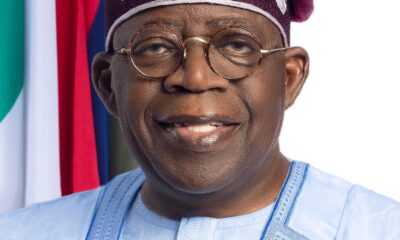
 News11 months ago
News11 months agoHURIWA Blames Serial Stampedes on Weaponized Poverty, Warns of Nigeria’s Rapid Decline
-

 News10 months ago
News10 months agoJealous Husband Stabs Nigerian Bishop To Death Over Suspicion Of Sleeping With Estranged Wife
-

 News10 months ago
News10 months agoTinubu sympathizes with ex-speaker Bankole on the death of his mother
-

 Health8 months ago
Health8 months agoA complete list of 154 healthcare facilities across Nigeria that provide free emergency obstetric care and VVF (Vesico-Vaginal Fistula) surgeries.













